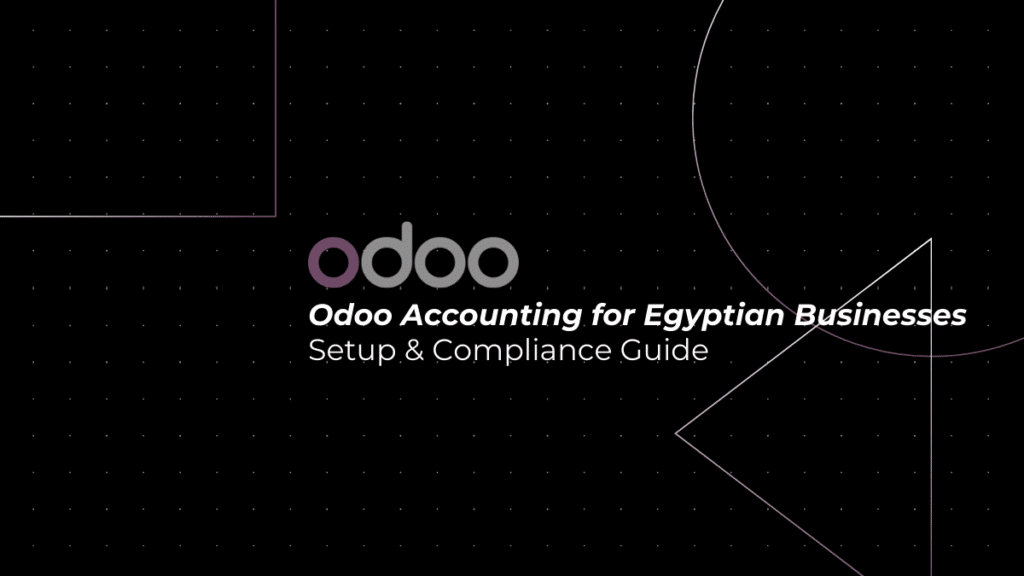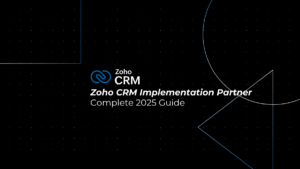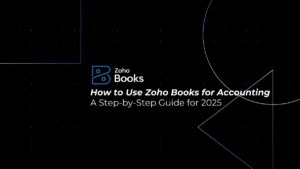Table of Contents
ToggleINTRODUCTION
Odoo accounting is revolutionizing financial management for Egyptian businesses by streamlining compliance through powerful, integrated tools. In today’s regulatory landscape, maintaining egyptian tax compliance is non-negotiable, and Odoo’s advanced automation features—such as its AI-powered bank reconciliation, which matches up to 95% of transactions automatically—offer a significant edge for financial managers and accountants. This guide promises to deliver practical, step-by-step insights into leveraging Odoo accounting’s robust compliance framework to optimize accounting software efficiency and ensure seamless adherence to local and international standards.
OVERVIEW OF ODOO ACCOUNTING AND ITS COMPLIANCE FRAMEWORK
Odoo accounting is more than just accounting software; it’s a comprehensive platform that unites multiple business functions to deliver real-time, accurate financial insights. For Egyptian businesses, the compliance framework focuses on adapting to local regulations, such as egyptian tax compliance, while simultaneously aligning with global standards like GDPR and IFRS. By integrating modules that handle multi-company management, multi-currency support, and detailed audit trails, Odoo accounting helps financial managers reduce manual errors, optimize workflow, and ensure adherence to statutory obligations.
Key benefits include:
- Streamlined management of inter-company transactions
- Automated tax computations and compliance reporting
- Detailed audit trails that enhance transparency and accountability
- Real-time dashboards for instant decision-making
- Localized functionality like e-invoicing tailored to Egyptian regulations
MULTI-COMPANY AND MULTI-CURRENCY COMPLIANCE
In today’s interconnected world, many Egyptian businesses operate in diverse local and international markets. Odoo accounting facilitates seamless multi-company management by allowing each branch or subsidiary to manage its own chart of accounts while integrating into a unified corporate system, as well as handling transactions in multiple currencies with real-time updates. This feature also ensures that consolidated financial reports are accurate and audit-ready.
For example, an Egyptian conglomerate with branches in the UAE or Europe can aggregate data from various currencies, ensuring transparent and audit-ready consolidated statements. This capability is crucial for adhering to international financial management practices and maintaining compliance under varying economic conditions.
TAX MANAGEMENT AND REPORTING
Tax compliance is a cornerstone of financial management. Odoo accounting’s tax management features include an advanced tax engine that automates complex calculations for VAT, GST, and sales tax. It supports both accrual and cash-based accounting methods and generates country-specific tax audit reports for in-depth verification.
Practical Example: Imagine an accountant managing hundreds of invoices from suppliers and customers. Odoo automatically computes the applicable tax, records the transactions, and reconciles the tax amounts—reducing error risks and easing regulatory reporting. Notably, the built-in cash-basis handling allows alignment of tax liabilities with actual cash flows, an essential requirement for egyptian tax compliance and budgeting practices.
Actionable Advice: Regularly review tax configurations in Odoo to ensure they reflect current local tax laws and utilize automated journal entries to update tax liabilities seamlessly.
AUDIT TRAILS AND TRANSPARENCY

Maintaining transparency in financial reporting is one of the most significant compliance challenges. Odoo accounting addresses this challenge by offering a comprehensive audit trail for every transaction. Every modification to invoices, journal entries, or account balances is recorded, and detailed tracking of user actions ensures accountability.
Real-World Application: In an audit scenario, a financial manager of an Egyptian enterprise can leverage Odoo’s detailed audit logs to present a clear, chronological account of all financial transactions. This facilitates faster, hassle-free audits and reinforces trust among investors and regulatory bodies. An internal tip is to routinely generate audit trail reports and flag any suspicious modifications immediately.
DATA SECURITY AND REGULATORY ADHERENCE
In an era where data breaches can lead to regulatory penalties and loss of stakeholder trust, Odoo accounting prioritizes data security. Role-based access controls restrict sensitive information to authorized personnel, while built-in encryption and regular backups protect financial data from external threats.
Moreover, compliance with international standards such as GDPR and IFRS ensures that even as financial data is processed and stored, privacy regulations are strictly adhered to. This is particularly vital for Egyptian businesses where data security and egyptian tax compliance go hand-in-hand.
Practical Implementation: Ensure periodic security audits of your Odoo setup and update access permissions regularly.
LOCALIZATION FOR REGIONAL COMPLIANCE
Localization is critical when implementing accounting software in any region. For Egyptian businesses, this means tailoring Odoo to meet local regulations. Preconfigured charts of accounts and fiscal positions can be customized according to egyptian tax laws, and specialized localization modules offer functionalities such as e-invoicing, digital tax filings, and adherence to newly implemented local policies.
Integration with local banks and financial institutions further facilitates faster reconciliation and improved transparency. For instance, a company in Cairo seeking to implement e-invoicing as per new local regulations can use Egypt-specific modules to generate compliant digital invoices automatically.
Tip for Financial Managers: Regularly check for system updates from Odoo that include the latest local regulatory changes.
AUTOMATION FOR COMPLIANCE EFFICIENCY
Automation is one of the cornerstones of Odoo accounting, greatly reducing manual errors and ensuring consistent regulatory compliance. Among its critical automated features are the AI-powered bank reconciliation—which matches up to 95% of transactions automatically—automated journal entries, and real-time dashboards that monitor key performance indicators.
Practical Scenario: Consider a busy finance department in an Egyptian SME. With hundreds of daily transactions, manual reconciliation can be error-prone and time-consuming. Odoo’s automated bank reconciliation not only accelerates the process, but it also reduces discrepancies that could lead to compliance issues.
Expert Tip: Leverage Odoo’s automation by integrating third-party applications that sync data from multiple systems and conduct regular training sessions for accounting staff.
SETTING UP ODOO ACCOUNTING FOR EGYPTIAN BUSINESSES: A STEP-BY-STEP GUIDE
This section provides a detailed implementation guide for financial managers and accountants looking to deploy Odoo accounting in Egypt.
Step 1: Assess Business Requirements
Identify the specific needs of your finance department, including multi-company operations, tax management requirements, and the need for localization features. Define clear compliance objectives, such as adhering to egyptian tax compliance and international standards, and engage stakeholders from IT, finance, and compliance teams.
Step 2: Plan the Implementation
Create a roadmap for integrating Odoo accounting with existing ERP and other business systems, allocate resources and set clear milestones for deployment and training, and decide on a phased rollout to minimize daily operational disruptions.
Step 3: Configure Multi-Currency and Tax Settings
Set up multi-currency support to handle transactions in both local currency (Egyptian Pound) and foreign currencies. Configure the tax engine based on current egyptian tax laws to ensure accurate VAT, sales tax, and other applicable tax computations. Regularly update these settings in line with local regulatory updates.
Step 4: Customize the Localization Modules
Install Egypt-specific modules offered by Odoo or its community to tailor functionalities such as e-invoicing, digital signatures, and localization of financial documents. Collaborate with local Odoo consultants to ensure configurations meet egyptian business practices and regulatory compliance.
Step 5: Establish Robust Data Security Protocols
Utilize role-based access control settings to restrict sensitive data and ensure encryption and data backup routines align with both international standards and local requirements. Regular auditing and updating of security configurations should be part of your compliance strategy.
Step 6: Implement Automation Tools
Activate AI-powered modules for bank reconciliation and automated tax calculation processes that feed directly into real-time dashboards. Set up automated alerts to flag irregularities and continuously refine your processes based on feedback.
Step 7: Train Your Staff
Conduct comprehensive training sessions emphasizing new tools, updated compliance frameworks, and localized settings. Develop training materials and consider certification courses that build expertise in managing Odoo accounting.
Step 8: Monitor, Audit, and Adjust
Schedule regular internal audits using Odoo’s audit trail and reporting features to ensure ongoing compliance. Use real-time dashboards to monitor transactions and compliance KPIs. Establish periodic review processes with key stakeholders and consider partnering with Odoo support or external audit firms for comprehensive reviews.
PRACTICAL EXAMPLES AND DO’S & DON’TS
Below is a “Do this, not that” guide to help understand best practices and common pitfalls when implementing the Odoo compliance framework.
Do’s:
- Implement automated tax reporting to minimize manual errors
- Regularly update multi-currency settings and tax configurations in line with current regulations
- Leverage audit trails to maintain transparent, verifiable financial records
- Invest in training sessions to enhance proficiency with new tools
- Customize Odoo’s localization features to align with egyptian tax compliance requirements
Don’ts:
- Rely solely on manual processes for tax calculations and reconciliations
- Neglect periodic updates or ignore regulatory change notifications
- Overlook the importance of detailed audit trails
- Assume default security settings are sufficient without customization
- Skip local consultations when configuring egyptian-specific functionalities
COMMON MISTAKES TO AVOID AND EXPERT TIPS
Implementing a comprehensive compliance framework is complex. Common mistakes include over-customization, inadequate training, failure to audit regularly, and ignoring user feedback. Such pitfalls can lead to integration issues, increased error rates, and non-compliance.
Expert Tips: Schedule quarterly reviews with your Odoo support team, integrate feedback loops for end-users, and document every customization change to preserve an unbroken audit trail. Benchmark your processes against industry standards to continually improve your compliance framework.
REAL-WORLD CASE STUDIES
Case Study 1: A Leading Egyptian SME
A mid-sized manufacturing company in Alexandria integrated Odoo accounting to streamline multi-currency transactions and enhance tax reporting accuracy. Within months, the automation features reduced reconciliation errors by over 40%, easing the annual audit process and ensuring compliance with egyptian tax requirements. Real-time dashboards enabled the finance team to spot and correct discrepancies swiftly, keeping the financial statements audit-ready.
Key Takeaways:
- Deploying localized modules significantly reduces human errors during peak periods
- Continuous monitoring via real-time dashboards aids proactive compliance management
Case Study 2: Financial Management in a Multi-Company Context
An Egyptian conglomerate with subsidiaries across different countries implemented Odoo accounting to manage complex inter-company transactions. By configuring a multi-company framework, each subsidiary maintained independence in booking local transactions while contributing to unified, consolidated reports. This approach allowed compliance with international financial management norms and bolstered overall transparency.
Key Takeaways:
- Multi-company management helps consolidate data without compromising local compliance
- Automatic currency conversion prevents misstatements in consolidated financial reports
BEST PRACTICES FOR LONG-TERM SUCCESS
Achieving sustainability in compliance management with Odoo accounting requires ongoing effort. Stay updated with local regulatory bulletins and Odoo release notes, continuously train multiple team members, benchmark your processes against industry standards, and collaborate with local user groups to share insights and best practices.
CONCLUSION
In today’s digital and regulated business environment, Odoo accounting provides Egyptian financial managers and accountants with an indispensable tool for ongoing compliance. Its robust automation, localized tax features, multi-company support, and comprehensive audit trails simplify daily operations while mitigating compliance risks. A systematic approach—from implementation to continuous monitoring—ensures your business remains agile and audit-ready. Effective use of accounting software like Odoo is key to sustaining long-term business success amid Egypt’s dynamic economic landscape.
ADDITIONAL RESOURCES & NEXT STEPS
To further enhance your understanding and implementation of Odoo accounting, consider exploring the following resources:
- Review Odoo’s official documentation for in-depth technical guidance on module customization
- Schedule consultation sessions with certified Odoo partners specializing in egyptian tax compliance
- Attend industry webinars and conferences to stay updated on the latest best practices in financial management and compliance
- Join online communities for practical insights and shared experiences from fellow Odoo users
By integrating these insights, real-world examples, and implementation strategies, financial managers and accountants can harness the full potential of Odoo accounting for robust compliance and operational efficiency. Welcome to a new era of intelligent financial management—your journey towards seamless egyptian tax compliance starts here!
Want hassle-free accounting that aligns with Egyptian tax laws?
PyramidBITS can help you set up and customize Odoo Accounting to ensure full compliance and efficiency.
Reach out today for a free consultation and simplify your financial management with Odoo!



